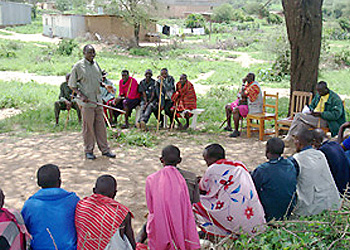
Why
In Maasai society, men have all the decision-making power, and are, therefore, essential to achieving the MGEF’s goals. The majority of mothers want their daughters to get an education, but they have no authority to change cultural beliefs and practices. They do not have a “right” to stop circumcision of their daughters, or prevent early marriages, or demand that their husbands use condoms or be faithful.
Curriculum
Workshops for Elders and Mothers address age-old cultural beliefs and practices that contribute to illiteracy among girls and women in the context of a changing world. Fathers and mothers attend separate workshops to discuss the value of girls’ education versus child marriage, the harmful health impact of female genital mutilation, the burden of teen pregnancy on the family, and the dangers of HIV. The workshops aim to raise awareness of the benefits to all of educating daughters and to empower them, as parents, to help their children and the next generation have a better life in a rapidly changing world. Traditionally, men and women do not consult each other on family matters, but at the end of the workshops, they are brought together to summarize what they have learned and decide the way forward.
